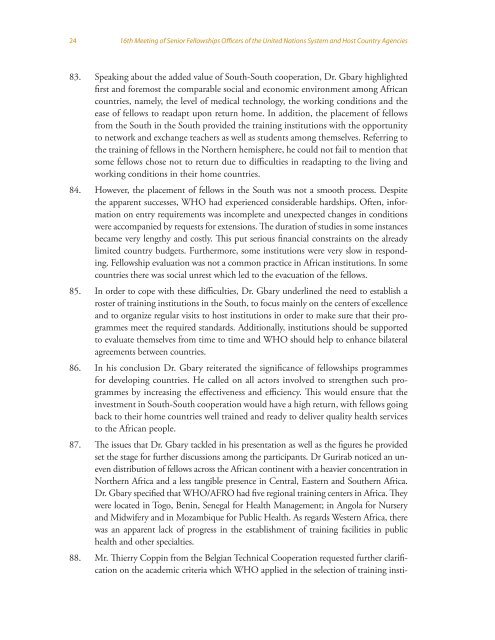16th Meeting of Senior Fellowships Officers of the ... - Development
16th Meeting of Senior Fellowships Officers of the ... - Development
16th Meeting of Senior Fellowships Officers of the ... - Development
Create successful ePaper yourself
Turn your PDF publications into a flip-book with our unique Google optimized e-Paper software.
24<br />
<strong>16th</strong> <strong>Meeting</strong> <strong>of</strong> <strong>Senior</strong> <strong>Fellowships</strong> <strong>Officers</strong> <strong>of</strong> <strong>the</strong> United Nations System and Host Country Agencies<br />
83. Speaking about <strong>the</strong> added value <strong>of</strong> South-South cooperation, Dr. Gbary highlighted<br />
first and foremost <strong>the</strong> comparable social and economic environment among African<br />
countries, namely, <strong>the</strong> level <strong>of</strong> medical technology, <strong>the</strong> working conditions and <strong>the</strong><br />
ease <strong>of</strong> fellows to readapt upon return home. In addition, <strong>the</strong> placement <strong>of</strong> fellows<br />
from <strong>the</strong> South in <strong>the</strong> South provided <strong>the</strong> training institutions with <strong>the</strong> opportunity<br />
to network and exchange teachers as well as students among <strong>the</strong>mselves. Referring to<br />
<strong>the</strong> training <strong>of</strong> fellows in <strong>the</strong> Nor<strong>the</strong>rn hemisphere, he could not fail to mention that<br />
some fellows chose not to return due to difficulties in readapting to <strong>the</strong> living and<br />
working conditions in <strong>the</strong>ir home countries.<br />
84. However, <strong>the</strong> placement <strong>of</strong> fellows in <strong>the</strong> South was not a smooth process. Despite<br />
<strong>the</strong> apparent successes, WHO had experienced considerable hardships. Often, information<br />
on entry requirements was incomplete and unexpected changes in conditions<br />
were accompanied by requests for extensions. The duration <strong>of</strong> studies in some instances<br />
became very lengthy and costly. This put serious financial constraints on <strong>the</strong> already<br />
limited country budgets. Fur<strong>the</strong>rmore, some institutions were very slow in responding.<br />
Fellowship evaluation was not a common practice in African institutions. In some<br />
countries <strong>the</strong>re was social unrest which led to <strong>the</strong> evacuation <strong>of</strong> <strong>the</strong> fellows.<br />
85. In order to cope with <strong>the</strong>se difficulties, Dr. Gbary underlined <strong>the</strong> need to establish a<br />
roster <strong>of</strong> training institutions in <strong>the</strong> South, to focus mainly on <strong>the</strong> centers <strong>of</strong> excellence<br />
and to organize regular visits to host institutions in order to make sure that <strong>the</strong>ir programmes<br />
meet <strong>the</strong> required standards. Additionally, institutions should be supported<br />
to evaluate <strong>the</strong>mselves from time to time and WHO should help to enhance bilateral<br />
agreements between countries.<br />
86. In his conclusion Dr. Gbary reiterated <strong>the</strong> significance <strong>of</strong> fellowships programmes<br />
for developing countries. He called on all actors involved to streng<strong>the</strong>n such programmes<br />
by increasing <strong>the</strong> effectiveness and efficiency. This would ensure that <strong>the</strong><br />
investment in South-South cooperation would have a high return, with fellows going<br />
back to <strong>the</strong>ir home countries well trained and ready to deliver quality health services<br />
to <strong>the</strong> African people.<br />
87. The issues that Dr. Gbary tackled in his presentation as well as <strong>the</strong> figures he provided<br />
set <strong>the</strong> stage for fur<strong>the</strong>r discussions among <strong>the</strong> participants. Dr Gurirab noticed an uneven<br />
distribution <strong>of</strong> fellows across <strong>the</strong> African continent with a heavier concentration in<br />
Nor<strong>the</strong>rn Africa and a less tangible presence in Central, Eastern and Sou<strong>the</strong>rn Africa.<br />
Dr. Gbary specified that WHO/AFRO had five regional training centers in Africa. They<br />
were located in Togo, Benin, Senegal for Health Management; in Angola for Nursery<br />
and Midwifery and in Mozambique for Public Health. As regards Western Africa, <strong>the</strong>re<br />
was an apparent lack <strong>of</strong> progress in <strong>the</strong> establishment <strong>of</strong> training facilities in public<br />
health and o<strong>the</strong>r specialties.<br />
88. Mr. Thierry Coppin from <strong>the</strong> Belgian Technical Cooperation requested fur<strong>the</strong>r clarification<br />
on <strong>the</strong> academic criteria which WHO applied in <strong>the</strong> selection <strong>of</strong> training insti-

















